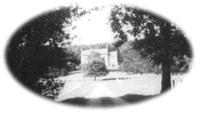Who?
*Who was involved ?- A prestigious Donegal family and a High Society girl*
The McClintock family of Dunmore, Carrigans, Co Donegal, was at the centre of the affair, along with Helen Mackworth, a society girl form Devon. Colonel Robert McClintock had served in Africa in World War I and then India during the twilight of the Raj. In the early 1920s, having retired, he returned to Dunmore with his wife and young son, William, to manage his Donegal estate. The McClintocks could trace their roots back to the Plantation and were Lords of the Manor at Carrigans - their present abode, Dunmore, having been built in the 18th century. William, an only son, would eventually graduate from Sandhurst and become engaged to Helen Mackworth in 1937 - the stage was set for the tragic events to come.
*The Characters*
*The Colonel* - he suited the stereotype image of a Colonel, to a tee. McClintock was a gruff man. He often seemed lost in reveries about his times in the theatres of war and had little time for conversation. The Colonel had been an engineer and back in Donegal, spent his days making sundials and concrete fences for his estate. As it turned out, he was right at the centre of the riddle that was Dunmore.
*Jennie McClintock * - an intelligent, dreamy, compassionate woman, with unusual friends - she loved gardening, but more than anything, doted on her son William. How much possessive mother-love contributed to the Dunmore affair, is a frequently posed question.
*William McClintock * - a handsome young officer, public school educated, Sandhurst cadet. He would take on a challenge, without hesitation. Ironically he broke his back, trying to win a steeplechase race, in order to please his fiancee, Helen Mackworth. As a result, he was paralysed and subsequently, had to lie flat on his back on a stretcher.
*Helen Mackworth * - described as the darling of the Devon riding set, Helen was stunningly attractive and had a warm, open personality. She fell head over heels for William and insisted on marriage, despite his paralysis - but did such a strong bond of love, contribute to the Dunmore tragedy?
*Nurses Trotter and Hawkey * - responsible for William's medical well-being, they, too, were at the very centre of the Dunmore affair and among the first on the scene, pronouncing William dead. They knew everyone in Dunmore, intimately and their evidence played a crucial part in the affair.
*The Servants, Maggie and Martha * - employed in Dunmore, from an early age, they, also, were in the dwelling when the tragedy was played out. As servants do they would have been au fait with much of what was going on in the house at the time. Both were very forthcoming with information and contributed greatly to the gathering mass of evidence as to what might actually have happened on that fateful September afternoon in 1938.
*The Gardeners * - four gardeners were employed and were drawn into the affair sufficiently enough for their evidence to be highly significant in coming to an understanding of the Dunmore affair.
